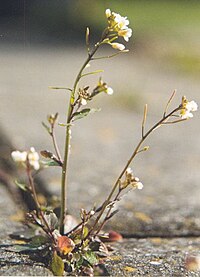Arabidopsis thaliana

Arabidopsis thaliana is a tiny plant that scientists use to learn about how plants grow and how they make seeds. It is small and easy to grow in gardens, so scientists like to study it because they can do lots of experiments with it.
Think of the little plant like a puzzle, and scientists want to figure out how all of the different pieces fit together. They want to figure out things like how the plant makes energy from sunlight, how it takes in water and nutrients from the soil, and how it uses those things to grow and make seeds.
One of the reasons Arabidopsis thaliana is so useful to scientists is because it has a really small genome, which is like its instruction manual. Scientists can look at this instruction manual to figure out which genes are important for different parts of the plant's growth and development.
Overall, Arabidopsis thaliana is like a little plant puzzle that scientists can use to learn about how all plants grow and reproduce.
Think of the little plant like a puzzle, and scientists want to figure out how all of the different pieces fit together. They want to figure out things like how the plant makes energy from sunlight, how it takes in water and nutrients from the soil, and how it uses those things to grow and make seeds.
One of the reasons Arabidopsis thaliana is so useful to scientists is because it has a really small genome, which is like its instruction manual. Scientists can look at this instruction manual to figure out which genes are important for different parts of the plant's growth and development.
Overall, Arabidopsis thaliana is like a little plant puzzle that scientists can use to learn about how all plants grow and reproduce.
Related topics others have asked about:
